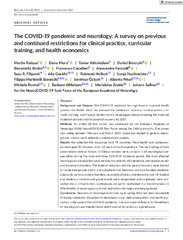| dc.description.abstract | Background and Purpose The COVID-19 pandemic has significantly impacted health systems worldwide. Here, we assessed the pandemic's impact on clinical service, curricular training, and financial burden from a neurological viewpoint during the enforced lockdown periods and the assumed recovery by 2023. Methods An online 18-item survey was conducted by the European Academy of Neurology (EAN) NeuroCOVID-19 Task Force among the EAN community. The survey was online between February and March 2023. Questions related to general, demographic, clinical, work, education, and economic aspects. Results We collected 430 responses from 79 countries. Most health care professionals were aged 35–44 years, with >15 years of work experience. The key findings of their observations were as follows. (i) Clinical services were cut back in all neurological subspecialties during the most restrictive COVID-19 lockdown period. The most affected neurological subspecialties were services for patients with dementia, and neuromuscular and movement disorders. The levels of reduction and the pace of recovery were distinct for acute emergencies and in- and outpatient care. Recovery was slow for sleep medicine, autonomic nervous system disorders, neurorehabilitation, and dementia care. (ii) Student and residency rotations and grand rounds were reorganized, and congresses were converted into a virtual format. Conferences are partly maintained in a hybrid format. (iii) Affordability of neurological care and medication shortage are emerging issues. Conclusions Recovery of neurological services up to spring 2023 has been incomplete following substantial disruption of neurological care, medical education, and health economics in the wake of the COVID-19 pandemic. The continued limitations for the delivery of neurological care threaten brain health and call for action on a global scale. | |

